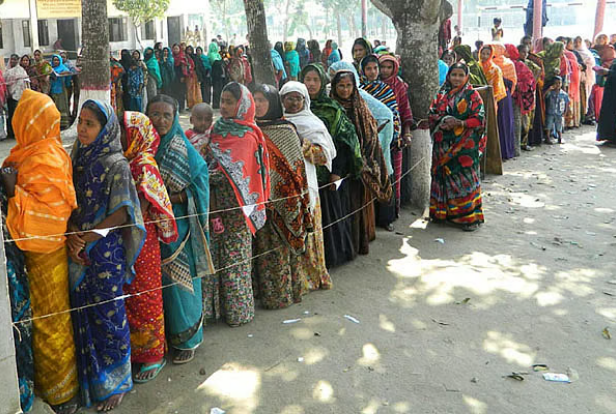The issue of the national election is coming to the fore repeatedly. The major political parties are also seeking the election to be held at the earliest possible time. The interim government as well as the election commission is also saying that they are preparing for the election. The chief adviser of the interim government, Dr Muhammad Yunus, has recently revealed they are planning to organise the election in December 2025. The election commission has disclosed they are taking preparation to hold the election targeting December.
Earlier, the chief adviser had said that the election can be held in December 2025 after carrying out some reforms or the election can be held in June 2026 after carrying out a bit more reforms. After this announcement, the Bangladesh Nationalist Party (BNP) insisted that the election be held in the middle of this year. However, the BNP does not seem to have any objection if the election is held in December this year. The party is demanding election at the earliest possible time after minimum reforms while Bangladesh Jamaat-e-Islami recently met the election commission and said they want election after the reforms.
There are more political parties including the Communist Party of Bangladesh (CPB), Gono Odhikar Parishad, Jatiya Samajtantrik Dal (JSD), Nagorik Oikya and AB Party who are also demanding the national election. A new political party of the students who led the mass uprising that unseated the Sheikh Hasina-led government, is to be floated at the end of February. This new party is expected to contest the next parliamentary election.
After the fall of the fascist Sheikh Hasina government through the students-led mass uprising on 5 August, there is no denying that people from across the country as well as across the world are expecting a peaceful handover of power to an elected government. But the question is how this will happen? How will the election be an inclusive one? After Shekih Hasina fled to India, her party Awami League is absent in all political process. Questions crop up in people’s mind whether the Awami League will contest the election or not.
Leaders of various tiers of Awami League are either in the jail or on the run as nearly 1000 people were killed and over 20,000 injured by the security forces and Awami League men during the July-August uprising. The party leaders and associates are also facing cases of massive corruption and money laundering.
The fact-finding report of the Office of the United Nations (UN) High Commissioner for Human Rights (OHCHR) unravelled the details of how the ousted Awami League government had employed the police as well as party cadres to suppress the students and people during the July uprising. It says Awami League supporters and police carried out coordinated attacks on the protesters. The OHCHR report was published from Geneva last Wednesday.
In this context it has become a big challenge for the Awami League to turn around in near future. The party has not shown an iota of remorse for their misdeeds. It has also not admitted its past mistakes as the party held onto power for three consecutive terms without proper elections in 2014, 2018 and 2024. However, the party has huge vote banks.
BNP came to power in 1991 with 30.81 per cent of votes while Awami League got 30.08 per cent of votes. Awami League won in the election of 1996 with 37.44 per cent of votes while BNP got 33.60 per cent of votes. BNP won the election of 2001 with 40.13 per cent of votes while Awami League got 40.97 per cent of votes. In 2008, Awami League won the election with 48.04 per cent of votes while BNP got 32.50 per cent of votes.
In context of the election, It is said that voters do not make mistakes. Whenever they get chance, they exercise their franchise properly and determine the fate of the party. But the irony of fate is that the political parties do not value the judgment of the voters. When they are in power, they don the role of the masters, instead of people’s representatives. Instead of practising democracy inside the party, establishing rule of law and good governance, the party in power becomes autocratic in nature and act accordingly. These parties in power are frightened to quit power and so deny a free and fair election. They plan to eliminate the opponent and hold onto power by force. The result is zero in the long term as they are eventually forced to exit at a certain point of time.
After the recent change, one thing is noticeable. After the fall of Awami League government, the BNP came into the limelight. There was a perception that the party has cent per cent chance to go to power if a free and fair election takes place. But with the passage of time, it was noted that a section of leaders and activists of BNP and its associate bodies indulged in extortion and grabbing across the country. This led to a waning in support for the party and a tarnishing of its image. Despite expelling hundreds of leaders and activists, the party could not rein in the misdeeds of the party leaders.
Defying the expectations of the people, the parties in power have the propensity to implement their own agenda, indulge in corruption, misgovernance and autocracy. People are exhausted with this. Where is the remedy? People want change. Either political parties will change themselves or nature will take its own course. Political parties may resist change and simply stride down the wrong path again, not learning any lessons. But people will not make a mistake. They expect a free and fair election and that state power will be handed over to the elected government. Is there any other option?
*Rabiul Islam is a journalist at Prothom Alo. He can be reached at rabiul.islam@prothomalo.com.

